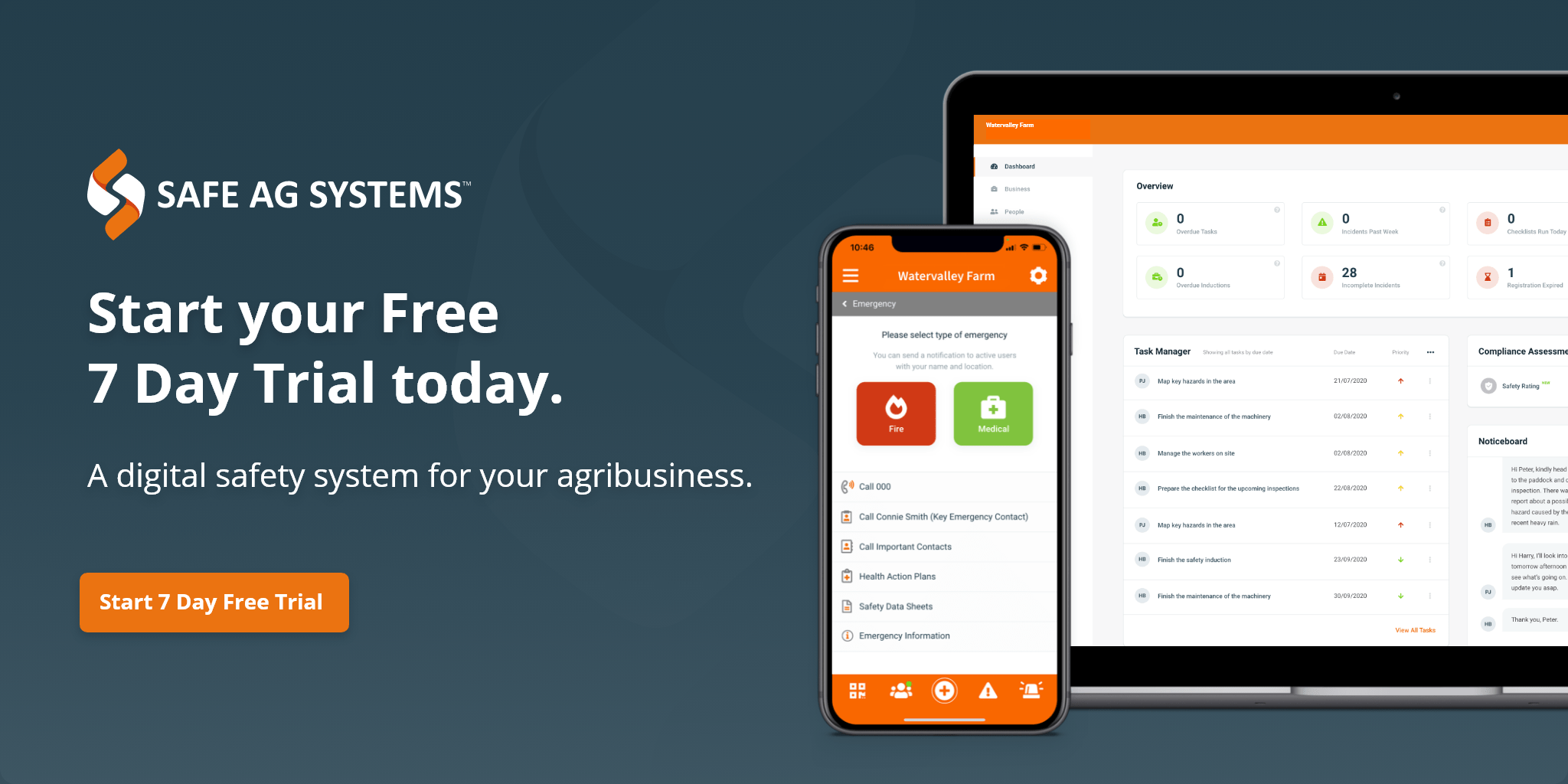Are you ready for 1st of July 2024?
You’ve probably heard by now that change is coming, specifically related to health and safety laws in South Australia. But do you know exactly what is changing? Industrial Manslaughter laws are evolving, and yes, that may affect how you manage safety on farm.
In July 2008, the Council of Australian Governments signed the intergovernmental agreement to work together in order to harmonise work health and safety laws. Whilst South Australia has already adopted model WHS laws provided by Safe Work Australia, the Amendment Bill will introduce a new offence of industrial manslaughter into the Work Health and Safety Act 2012.
What’s changing in South Australia?
On 29 November 2023, the South Australian Parliament passed the Work Health and Safety (Industrial Manslaughter) Amendment Bill.
The introduction of the Work Health and Safety (Industrial Manslaughter) Amendment Bill establishes substantial increases in penalties for an offence. Maximum penalties include $18M fines for companies, and individuals can face up to 20 years imprisonment.
Under this new law, the offence of industrial manslaughter does not apply to workers, but to the person conducting a business or undertaking (PCBU), or an officer of a PCBU, who are duty holders under the WHS Act.
Unsure if you’re a PCBU? Most farming businesses are likely to be a PCBU and therefore have legal responsibilities. In some circumstances there may be more than one PCBU for your farm, such as if you are part of a bigger corporation, are a partner or have partners or a Board. So, what exactly is a PCBU? It’s a legal entity and despite the name, does not necessarily mean a natural person.
Why change the Work, Health and Safety laws?
With these new industrial manslaughter laws, no new duties have been introduced that did not already exist within the WHS Act. But the new laws do bring South Australia inline with WA, NSW, QLD, NT and the ACT.
SafeWork SA state, “The new laws ensure the most serious health and safety breaches carry a penalty which sends a clear message that people who place workers’ lives at risk will be held to account. These penalties also recognise the significant loss suffered by the families of workers who die in preventable workplace incidents.”
What does this mean for South Australian farmers?
Compliance for South Australian farmers remains unchanged under the WHS Act, so long as the duty holder is already complying with their duties, the WHS Act and Regulations. If there is a breach of those duties, resulting in the death of a person, the penalty has been increased to match the severity of the crime. We all deserve to go home safe at the end of the day.
Good news for those of us that are already addressing farm safety in their business. But now, its time to review policies, procedures and other important documents to ensure they’re up-to-date.
Some key points to remember:
-
Industrial manslaughter offences will not be subject to a 2-year statute of limitation as is the case for other offences within the WHS Act.
-
Industrial manslaughter only applies when all components of the offence are proven. Where a persons conduct is reckless or grossly negligent and results in the death of an individual.
-
An alternative verdict of guilt for a Category 1, Category 2, or Category 3 offence will be available if the trier of fact is not satisfied that a person is guilty of industrial manslaughter, but is satisfied the person is guilty of a lower-tier offence under the WHS Act.
what is industrial manslaughter?
SafeWork SA clarify that industrial manslaughter only applies when all components of the offence are proven. A person commits the offence of industrial manslaughter if:
-
the person has a health and safety duty; and
-
the person engages in conduct that breaches that duty; and
-
the conduct causes the death of an individual to whom that duty is owed; and
-
the person engages in the conduct with gross negligence or is reckless as to the risk to an individual of death or serious injury or illness.
Where to start?
The new laws will commence on 1st of July 2024 so if you’ve been a bit too relaxed around health and safety on your farm, this is the perfect time to get started.
There are a number of options available for farm safety management systems, you could stick with the old and faithful, but flawed paper-based system or take the opportunity to go digital.
We’ve heard it many times before, paper-based systems are fantastic when you first buy them… then a few months down the track files are misplaced, things become outdated and a person moves and their incoherent filing system wreaks havoc.
Whatever option you choose, ensure it is made for the farming and agricultural industry. Farms are unique workplaces, they present a range of hazards that other industries might encounter and others that are distinctly agricultural hazards. Remember, its not just about compliance, its about keeping your workers safe by reducing risks.
To read more about these changes at the SafeWork SA website.
Disclaimer: Content on this website may be of relevance to users outside of Australia, but content links and examples are specific to Australia. Please check with your local authority for your country and industry requirements.











